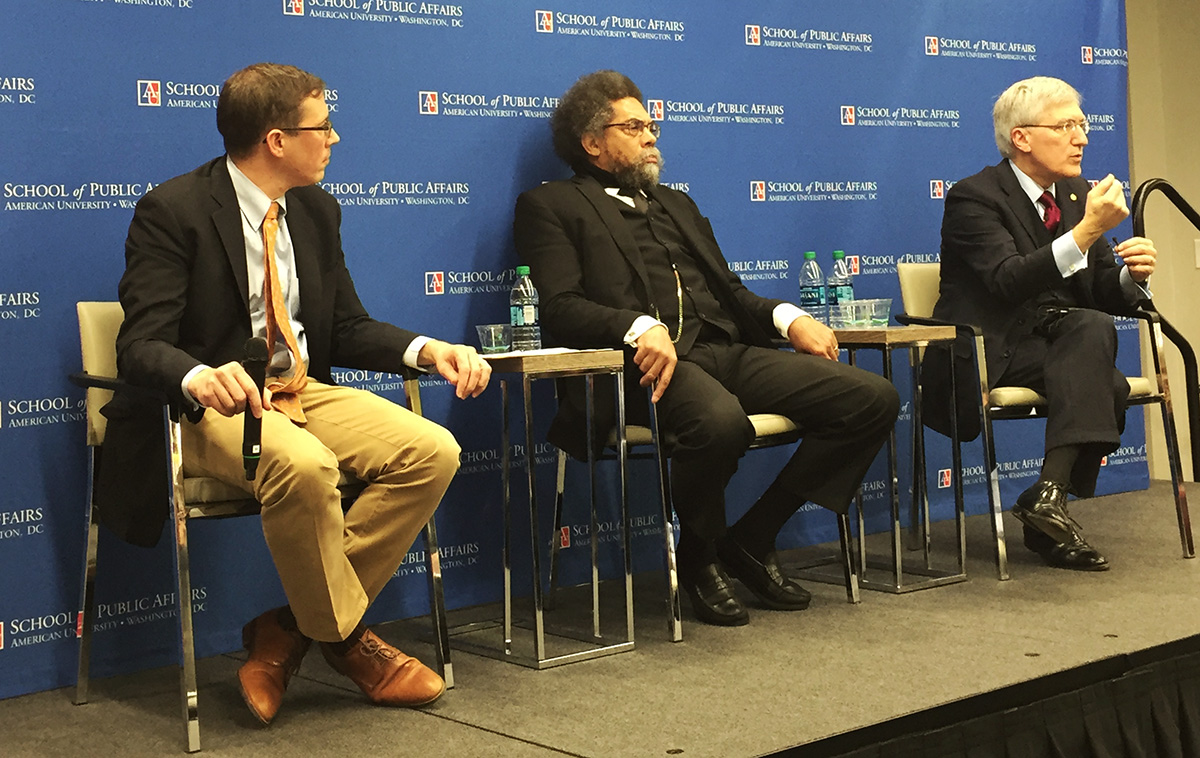Last Thursday, I had the pleasure of attending a panel discussion at American University’s School of Public Affairs titled “The Importance of a Liberal Education.” The panel included Cornel West (pictured middle), professor of philosophy at Harvard University, and Robert George (pictured right), professor of jurisprudence at Princeton University, and was moderated by Thomas Merrill (pictured left), American University professor and associate director of the Political Theory Institute.
 Cornel West, an outspoken liberal, and Robert George, an equally forthright conservative, have struck an uncommon friendship in today’s polarizing political climate, and love to debate each other on policy issues. On this panel, however, they agreed on one unlikely topic: the importance of disagreement. They both stressed how a liberal education should challenge an individual’s conceptions, opinions, and intellectual perspectives. Dr. George noted that every student steeped in the liberal education should read both Hayek and Marx, Burke and Rousseau. If a professor has not seriously challenged or altered your political views, Dr. George commented, you have not had a true liberal education.
Cornel West, an outspoken liberal, and Robert George, an equally forthright conservative, have struck an uncommon friendship in today’s polarizing political climate, and love to debate each other on policy issues. On this panel, however, they agreed on one unlikely topic: the importance of disagreement. They both stressed how a liberal education should challenge an individual’s conceptions, opinions, and intellectual perspectives. Dr. George noted that every student steeped in the liberal education should read both Hayek and Marx, Burke and Rousseau. If a professor has not seriously challenged or altered your political views, Dr. George commented, you have not had a true liberal education.
Aside from the political, a rigorous liberal education must address the philosophical. It should force one to grapple with life’s longstanding questions. By engaging students with these questions, like the meaning of life or the possibility of an afterlife, Dr. West eloquently stated that a “liberal arts education is teaching you to learn how to die.” A liberal education is therefore a spiritual investment, and, for Dr. West, a remedy for today’s materialism and shallow culture.
The audience embodied the panel’s ideal of engaging across ideological differences: In attendance were college republicans, left-leaning students, and black fraternity members. The panel successfully garnered a racially, sexually, and intellectually diverse audience. And the most encouraging part was that the packed crowd was full of students who were excited about and receptive to the panel’s ideas.
I was encouraged by the large turnout of students from a wide range of social and political backgrounds. With our country extremely divided, conversations like “Liberal Education and the Examined Life” should serve as a reminder that our nation can only thrive when intellectual diversity is protected and actively encouraged on college campuses.
 Cornel West, an outspoken liberal, and Robert George, an equally forthright conservative, have struck an uncommon friendship in today’s polarizing political climate, and love to debate each other on policy issues. On this panel, however, they agreed on one unlikely topic: the importance of disagreement. They both stressed how a liberal education should challenge an individual’s conceptions, opinions, and intellectual perspectives. Dr. George noted that every student steeped in the liberal education should read both Hayek and Marx, Burke and Rousseau. If a professor has not seriously challenged or altered your political views, Dr. George commented, you have not had a true liberal education.
Cornel West, an outspoken liberal, and Robert George, an equally forthright conservative, have struck an uncommon friendship in today’s polarizing political climate, and love to debate each other on policy issues. On this panel, however, they agreed on one unlikely topic: the importance of disagreement. They both stressed how a liberal education should challenge an individual’s conceptions, opinions, and intellectual perspectives. Dr. George noted that every student steeped in the liberal education should read both Hayek and Marx, Burke and Rousseau. If a professor has not seriously challenged or altered your political views, Dr. George commented, you have not had a true liberal education.